CAMBRIDGE UNITED FOOTBALL CLUB

Player and Parent Handbook
Name: Age Group:
DEVELOPING THE MATCH WINNER


Name: Age Group:
DEVELOPING THE MATCH WINNER
Introduction and Welcome Education
Academy Vision and Values
Life Skills
Match Winning Skills Player Care
Our Programme
Medical Information
Physical Development
Psychological Skills
Welfare Processes
Staff Information
Kit and Equipment
Academy Venues
Hydration and Nutrition FAQ’s
Video Analysis Academy Social Media
Talent ID and Pathway Player Notes
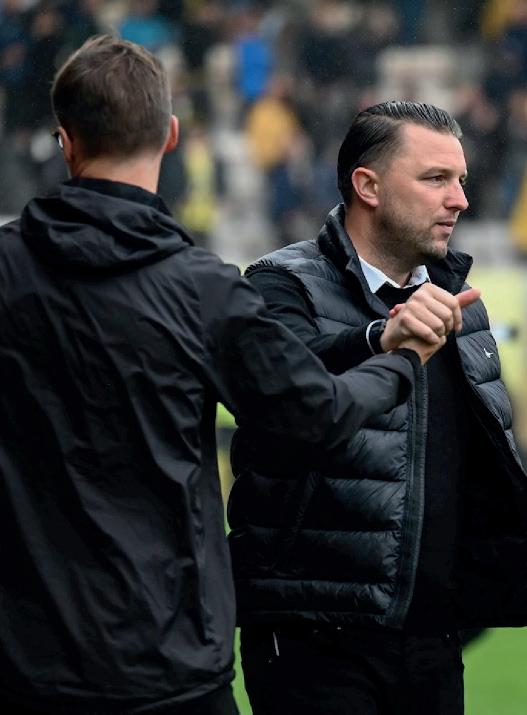
I hope this handbook can be a resource that helps you on your development pathway and is a place where you can find tips, advice and guidance as and when you need it.
The journey of any young person is testing, and it should be full of fun, varied experiences and challenges. Embrace the good bits and the tough stuff. Part of improving comes from being outside of your comfort zone and finding coping strategies to improve and learn. It’s a terrific challenge that I urge you all to embrace.
The Academy can be an excellent starting point and accelerate many of the life skills you require. Every coach will tell you that you have to be committed, train hard, work at the areas you should improve and get the best out of your body - but they’ll also say how fun it should be! Building relationships, performing in teams, working out how to navigate difficulties and being pro-active and responsible are just a few of the areas you can develop.
The social side of football is great, and everyone can benefit from this. We all enjoy working together, supporting each other, striving for a goal and achieving individual success.
Somewhere in the future lies the possibility of developing into a professional sportsman. We are proud of the progress of the young players who have represented our first team and we are equally proud of those who have represented us at any level, performing to their best.
But we have other aims too. Not everyone will go on to achieve professional status, but that is just one outcome every player should be striving for. Above all, if you can maximise your opportunities - that in itself is success.
Make the most of every situation to become a better player, a better person, and to build long lasting relationships that last a lifetime. Whilst you have this as a resource to help you, the best thing you can do if you need support is ask. There is so much information available out there for you to access, but conversations with people will always be the best.
Have an enjoyable season and remember - Attitude drives Performance.
Mark Bonner 1st Team Head CoachOur Academy Vision is something that we as staff do our upmost to achieve day in and day out:
To create an ASPIRATIONAL and NURTURING Academy that offers a LIFELONG, Memorable JOURNEY.
We want our environment to focus on being passionate, positive and professional as we believe this will give you the best ingredients to fulfil your potential.
What you achieve and where your highest level takes you will ultimately be down to you. However, we believe that you increase your chances of achievement by creating relationships that are conducive to you learning as much as you can along your journey as well as making it an enjoyable one!
Being UNITED as an Academy is so important for everyone to achieve their highest level.
We feel we have a really hard-working group of staff who will always put the needs of each individual before anything else, in order for you to progress – use all the resources that you have both at home and at the Academy to achieve your goals.
We are here to help and will do all we can to support you both on and off the pitch. Hopefully this handbook is a tool you can use to help you reach your potential.
In creating this handbook, our aim is to give you an overview of Academy life at different stages. What we are looking for from you, what you can expect from your time within the Academy and give you a reference point should you at any point need some support away from the Academy.
That said, we are always here to talk should you need us, and we will do our upmost to help.
Work as hard as you possibly can, practice as often as you can, listen and learn as much as you can and most importantly, enjoy playing for Cambridge United Football Club – everyone looks better with a smile on their face!
Dominick Knighton Academy Manager
The Cambridge United motto is ‘United in Endeavour’
It is achieved by everyone working together on and off the pitch. When you are part of Cambridge United the minimum requirement is maximum effort, from both staff and players. Our motto highlights the necessity for us to be a unified club, gaining strength through working collaboratively.


To create an aspirational and nurturing Academy that offers a lifelong, memorable journey.
CREATE CHALLENGE

INDIVIDUAL PROGRESSION
HOLISTIC DEVELOPMENT
As an Academy we strive to create a development programme that shares the values and vision of the club to foster a learning environment based on our core values of:

Hard Work:
We are committed to learning and working towards our pursuit of excellence in everything we do.
Honest:
We strive to build strong relationships through demonstrating honest behaviours consistently. It entails showing respect and having integrity and self-awareness.
Humble:
We are custodians responsible for protecting and enhancing the Academy for future generations.
We aim to maintain, continually review and improve our practice so that our young players are offered the best programme possible to allow them to be the best they can be. The philosophy is centred on the creation of an environment where all aspects of the Academy programme are challenging, inspirational, and enjoyable.

Our Academy Management Team, along with members of the 1st Team staff Team have created what we look for in a Cambridge United Football Club’s Academy player’s DNA.
The identity of our DNA should be representative of both our registered Academy players as well as what we look for in ‘new signings’
Although every player may not have every part of our DNA, we will put structures in place to allow you to develop and succeed within our framework. Both coaches, practitioners and players should strive towards achieving this identity.

Our teams will play with an emphasis on penetrating attacking football that dominates the midfield.
We will focus on forward passing, forward running and forward thinking wherever possible. We will try to press the ball as high up the pitch as the game allows and be flexible in our team shapes.
Our players must be competent in tight areas and are challenged to be a match winner through destroying, creating and goalscoring.
They must develop good game understanding in possession, out of possession and in transition to enable them to progress through the performance pathway.
We are not rigid tactically. Our football philosophy is not restricted to a particular system. Our football philosophy is all about principles of play that remain constant but can be implemented through different formations and systems.
DESTROYER
DEFENDING 1V1 VS DRIBBLER
DEFENDING VS FORWARD WITH BACK TO GOAL
DEFENDING VS OVERLOADS
CREATOR
BEATING A DEFENDER 1V1
CROSSING
PASSES TO CREATE COMBINATION PLAY
GOALSCORER




FINISHING INSIDE BOX FINISHING OUTSIDE THE BOX
FINISHING FROM CROSSES
HIGH PRESSING
CAN WE WIN THE BALL BACK AS HIGH AND EARLY AS POSSIBLE AND PRESS WITH INTENSITY TO STOP THEM BUILDING.

DOMINATE CENTRALLY
CAN WE PROTECT THE MIDDLE OF THE PITCH BY BEING COMPACT AND NARROW AND NOT ALLOW ANYTHING THROUGH US.
DEFEND YOUR BOX
1V1 DEFENDING, BLOCKS, CLEARANCES , MARKING & TRACK RUNS.
STOP/ BLOCK CROSSES
CAN WE STOP OPPOSITION CROSSES INTO OUR BOX BY BEING GOOD IN 1V1 DUELS.
SET TRAPS / FORCE WIDE
CAN WE SET TRAPS TO WIN THE BALL BACK AND FORCE ERROS. CAN WE KEEP IT WIDE IN MIDDLE AND DEFENSIVE THIRDS.
TRANSITION
CAN WE REACT AND REGAIN? ANTICIPATE LONG BALL IN BEHIND
BUILD OR BREAK
CAN WE LOOK TO EXPLOIT SPACE QUICKLY BY LOOKING TO BUILD THROUGH OR AROUND OPPOSITION.
DOMINATE CENTRALLY
CAN WE GAIN CONTROL IN THE MIDDLE OF THE PITCH BY CREATING OVERLOADS.
FORWARD PASSING, THINKING & RUNNING

CAN WE ALWAYS LOOK TO PENETRATE THE OPPOSITION.
FIND A WAY IN
CAN WE FREE IT WIDE IF THE OPPOSITION BLOCK THE BOX AND GO NARROW.
CROSS EARLY OR GO 1V1
CAN WE CROSS EARLY WHEN WE ARE IN WIDE AREAS OR GO 1V1 AND GET INTO THE BOX WITH THE BALL. TRANSITION
CAN WE BUILD OR BREAK? READ AND REACT TO THE OPPOSITION PRESS.
FINISHING FROM BUILDING
CAN YOU FIND YOUR WAY TO GOAL AND CREATE ENOUGH SPACE TO GET AN ATTEMPT ON GOAL.
FINISHING FROM A BREAK
CAN YOU FINISH AFTER A QUICK BREAK ATTACKING WITH SPEED THROUGH A DRIBBLE OR A PASS

FINDING GOALSCORING POSITIONS
CAN YOU FIND GOALSCORING POSITIONS INSIDE THE BOX THAT CAUSE OPPOSITION PROBLEMS.
FINISH FROM CROSSES
THE ABILITY TO FINISH FROM A CROSS, BOTH FROM THE GROUND AND AIR.
CUTBACKS/ CROSSES
THE ABILITY TO DELIVER A VARIETY OF CROSSING TECHNIQUES THAT LEAD TO A GOALSCORING ATTEMPT. DEEP CROSS, STOOD UP, WHIPPED AND CUTBACKS.
COMPOSED FINISHING
CAN WE FINISH THE ATTACK FROM PATIENT BUILD UP PLAY OR COUNTER ATTACKING OPPORTUNITIES.

The academies' playing philosophy is broken down clearly through our Cambridge United principles of play. The main emphasis in our principles of play are our Destroyer, Creator and Goal scorer Principles for the coaches which is broken down into our training curriculum.

The principles of play will be consistent throughout all the age groups, however as players progress through the age groups there are more sub principles to reflect where players are in their development as they get closer to the professional development phase to add more complexity.
In schoolboy age groups from U9’s – U14’s coaches are prescribed the 12 weekly topics which they must focus on during that period ensuring the delivery of our coaching curriculum is aligned to our playing philosophy.
In the U15’s – U21’s the coaching staff are encouraged to select from our club principles of play based on the group and individual needs ensuring that the player is central to what we do on the pitch.
The formations and shapes of the team can be flexible, but the principles will remain the same. The principles of play will allow the coaches to help develop the Match Winner in both the training and games programme.


CREATOR PRINCIPLES OF PLAY
BUILD OR BREAK
CAN WE LOOK TO EXPLOIT SPACE QUICKLY BY LOOKING TO BUILD THROUGH OR AROUND OPPOSITION.

BUILD OR
BREAK
DOMINATE CENTRALLY
CAN WE GAIN CONTROL IN THE MIDDLE OF THE PITCH BY CREATING OVERLOADS.
FORWARD PASSING, THINKING & RUNNING
CAN WE ALWAYS LOOK TO PENETRATE THE OPPOSITION.
FIND A WAY IN
CAN WE FREE IT WIDE IF THE OPPOSITION BLOCK THE BOX AND GO NARROW.
GO 1V1
GO 1V1 AND GET INTO THE BOX WITH THE BALL.
TRANSITION
CAN WE ATTACK QUICKLY UPON WINNING POSSESSION?

DESTROYER PRINCIPLES OF PLAY
DEFEND YOUR BOX
PRESS OR DROP?
DOMINATE CENTRALLY
TRANSITION – REACT AND REGAIN STOP/ BLOCK CROSSES
1V1 DUELS
HIGH PRESSING
CAN WE WIN THE BALL BACK AS HIGH AND EARLY AS POSSIBLE WITH INTENSITY.
DOMINATE CENTRALLY
1V1 DEFENDING, STOP OPPOSITION PLAYING THRU US BY GETTING INTO POSITIONS TO BLOCK AND INTERCEPT.
DEFEND YOUR BOX
CAN YOU MARK IN THE BOX AND STOP ATTEMPTS ON OUR GOAL BY MAKING BLOCKS AND TACKLES
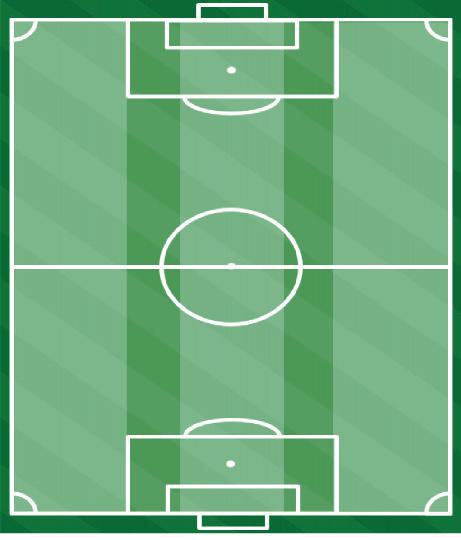
STOP/ BLOCK CROSSES
CAN WE STOP OPPOSITION CROSSES INTO OUR BOX BY CHOOSING THE APPROPRIATE 1V1 DEFENDING TECHNIQUE.
TRANSITION
CAN WE REACT AND REGAIN? ANTICIPATE LONG BALL IN BEHIND
GOALSCORER PRINCIPLES OF PLAY

FINISHING FROM BUILDING
CAN YOU FIND YOUR WAY TO GOAL AND CREATE ENOUGH SPACE TO GET AN ATTEMPT ON GOAL?
FINISHING FROM A BREAK
CAN YOU FINISH AFTER A QUICK BREAK ATTACKING WITH SPEED THROUGH A DRIBBLE OR A PASS?
FINDING GOALSCORING POSITIONS
CAN YOU FIND GOALSCORING POSITIONS INSIDE THE BOX THAT CAUSE OPPOSITION PROBLEMS?

COMPOSED FINISHING
CAN WE FINISH THE ATTACK FROM PATIENT BUILD UP PLAY OR FROM A BREAK.
COMPOSED FINISHING – FINISH THE ATTACK
EDGE OF BOX PENALTY
CUTBACKS CUTBACKS FAR NEAR


DESTROYER PRINCIPLES OF PLAY
HIGH PRESSING
CAN WE WIN THE BALL BACK AS HIGH AND EARLY AS POSSIBLE AND PRESS WITH INTENSITY TO STOP THEM BUILDING.
DEFEND YOUR BOX
ANTICIPATE LONG BALL - DROP
KEEP IT WIDE
KEEP IT WIDE
TRANSITION – REACT AND REGAIN
SET TRAPS / FORCE WIDE
HIGH PRESSING
FORCE ERRORS/ BE INTENSE
DOMINATE CENTRALLY
CAN WE PROTECT THE MIDDLE OF THE PITCH BY BEING COMPACT AND NARROW AND NOT ALLOW ANYTHING THROUGH US.
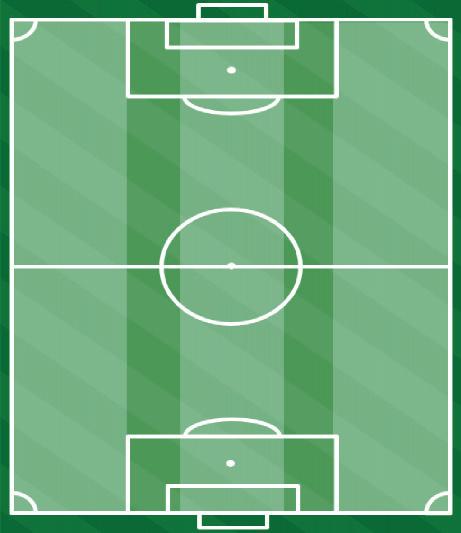
DEFEND YOUR BOX
1V1 DEFENDING, BLOCKS, CLEARANCES , MARKING & TRACK RUNS.
STOP/ BLOCK CROSSES
CAN WE STOP OPPOSITION CROSSES INTO OUR BOX BY BEING GOOD IN 1V1 DUELS.
SET TRAPS / FORCE WIDE
CAN WE SET TRAPS TO WIN THE BALL BACK AND FORCE ERROS. CAN WE KEEP IT WIDE IN MIDDLE AND DEFENSIVE THIRDS.
TRANSITION
CAN WE REACT AND REGAIN? ANTICIPATE LONG BALL IN BEHIND

CREATOR PRINCIPLES OF PLAY
BUILD OR BREAK
CAN WE LOOK TO EXPLOIT SPACE QUICKLY BY LOOKING TO BUILD THROUGH OR AROUND OPPOSITION.

BUILD OR BREAK
BREAKING LINES – PLAY FORWARD – THINK FORWARD
DOMINATE CENTRALLY
CAN WE GAIN CONTROL IN THE MIDDLE OF THE PITCH BY CREATING OVERLOADS.
FORWARD PASSING, THINKING & RUNNING
CAN WE ALWAYS LOOK TO PENETRATE THE OPPOSITION.
PLAY AROUND
FIND A WAY IN
PLAY AROUND
CAN WE FREE IT WIDE IF THE OPPOSITION BLOCK THE BOX AND GO NARROW.
CROSS EARLY OR GO 1V1
CAN WE CROSS EARLY WHEN WE ARE IN WIDE AREAS OR GO 1V1 AND GET INTO THE BOX WITH THE BALL.
PASSES TO CREATE – FIND A WAY IN - RUN BEYOND
TRANSITION
CAN WE BUILD OR BREAK? READ AND REACT TO THE OPPOSITION PRESS.
CROSS EARLY GO 1V1
FREE IT WIDE

GOALSCORER PRINCIPLES OF PLAY
FINISHING FROM BUILDING
CAN YOU FIND YOUR WAY TO GOAL AND CREATE ENOUGH SPACE TO GET AN ATTEMPT ON GOAL.
FINISHING FROM A BREAK
CAN YOU FINISH AFTER A QUICK BREAK ATTACKING WITH SPEED THROUGH A DRIBBLE OR A PASS
FINDING GOALSCORING POSITIONS
CAN YOU FIND GOALSCORING POSITIONS INSIDE THE BOX THAT CAUSE OPPOSITION PROBLEMS.

FINISH FROM CROSSES
THE ABILITY TO FINISH FROM A CROSS, BOTH FROM THE GROUND AND AIR.
CUTBACKS/ CROSSES
THE ABILITY TO DELIVER A VARIETY OF CROSSING TECHNIQUES THAT LEAD TO A GOALSCORING ATTEMPT. DEEP CROSS, STOOD UP, WHIPPED AND CUTBACKS.
COMPOSED FINISHING – FINISH THE ATTACK
DEEP CROSS
DEEP CROSS
COMPOSED FINISHING
CAN WE FINISH THE ATTACK FROM PATIENT BUILD UP PLAY OR COUNTER ATTACKING OPPORTUNITIES.
EDGE OF BOX PENALTY
FAR NEAR
CUTBACKS
CUTBACKS

DESTROYER PRINCIPLES OF PLAY
HIGH PRESSING
STOP/ BLOCK CROSSES
DEFEND YOUR BOX
ANTICIPATE LONG BALL - DROP
KEEP IT WIDE / TRAP
STOP/ BLOCK CROSSES
KEEP IT WIDE / TRAP
CAN WE WIN THE BALL BACK AS HIGH AND EARLY AS POSSIBLE AND PRESS WITH INTENSITY TO STOP THEM BUILDING.
DOMINATE CENTRALLY
CAN WE PROTECT THE MIDDLE OF THE PITCH BY BEING COMPACT AND NARROW AND NOT ALLOW ANYTHING THROUGH US.

DEFEND YOUR BOX
1V1 DEFENDING, BLOCKS, CLEARANCES , MARKING & TRACK RUNS.
STOP/ BLOCK CROSSES
CAN WE STOP OPPOSITION CROSSES INTO OUR BOX BY BEING GOOD IN 1V1 DUELS.

TRANSITION – REACT AND REGAIN
SET TRAPS / FORCE WIDE
HIGH PRESSING
SET TRAPS / FORCE WIDE
CAN WE SET TRAPS TO WIN THE BALL BACK AND FORCE ERROS. CAN WE KEEP IT WIDE IN MIDDLE AND DEFENSIVE THIRDS.
FORCE ERRORS/ BE INTENSE
TRANSITION
CAN WE REACT AND REGAIN? ANTICIPATE LONG BALL IN BEHIND

CREATOR PRINCIPLES OF PLAY
BUILD OR BREAK
CAN WE LOOK TO EXPLOIT SPACE QUICKLY BY LOOKING TO BUILD THROUGH OR AROUND OPPOSITION.

BUILD OR BREAK
BREAKING LINES – PLAY FORWARD – THINK FORWARD
DOMINATE CENTRALLY
CAN WE GAIN CONTROL IN THE MIDDLE OF THE PITCH BY CREATING OVERLOADS.
FORWARD PASSING, THINKING & RUNNING
CAN WE ALWAYS LOOK TO PENETRATE THE OPPOSITION.
PLAY AROUND
FIND A WAY IN
PLAY AROUND
CAN WE FREE IT WIDE IF THE OPPOSITION BLOCK THE BOX AND GO NARROW.
CROSS EARLY OR GO 1V1
CAN WE CROSS EARLY WHEN WE ARE IN WIDE AREAS OR GO 1V1 AND GET INTO THE BOX WITH THE BALL.
PASSES TO CREATE – FIND A WAY IN - RUN BEYOND
TRANSITION
CAN WE BUILD OR BREAK? READ AND REACT TO THE OPPOSITION PRESS.
CROSS EARLY GO 1V1
FREE IT WIDE
GOALSCORER PRINCIPLES OF PLAY

FINISHING FROM BUILDING
CAN YOU FIND YOUR WAY TO GOAL AND CREATE ENOUGH SPACE TO GET AN ATTEMPT ON GOAL.
FINISHING FROM A BREAK
CAN YOU FINISH AFTER A QUICK BREAK ATTACKING WITH SPEED THROUGH A DRIBBLE OR A PASS
FINDING GOALSCORING POSITIONS
CAN YOU FIND GOALSCORING POSITIONS INSIDE THE BOX THAT CAUSE OPPOSITION PROBLEMS.

FINISH FROM CROSSES
THE ABILITY TO FINISH FROM A CROSS, BOTH FROM THE GROUND AND AIR.
CUTBACKS/ CROSSES
THE ABILITY TO DELIVER A VARIETY OF CROSSING TECHNIQUES THAT LEAD TO A GOALSCORING ATTEMPT. DEEP CROSS, STOOD UP, WHIPPED AND CUTBACKS.
COMPOSED FINISHING – FINISH THE ATTACK
COMPOSED FINISHING
DEEP CROSS
CAN WE FINISH THE ATTACK FROM PATIENT BUILD UP PLAY OR COUNTER ATTACKING OPPORTUNITIES.
EDGE OF BOX PENALTY
DEEP CROSS WHIPPED STOOD UP
FAR NEAR
CUTBACKS
CUTBACKS

STARTING ATTACKS
Recognising when to build and when to break Comfortable with both feet
Technique variety and selection
Ball striking
Positive positioning
Decisions and footwork
Ways to affect the ball
Making and taking contact
MATCH WINNING SAVES
Effective actions and efficient techniques
Type of save and choice of save
Movement around your goal
Catching where possible
OWNERSHIP – PLAYER TAKE RESPONSBILITY FOR THEIR OWN DEVELOPMENT
TRUST – PLAYERS CAN BE TRUSTED TO DO THEIR BEST WHEN GIVING A TASK
SELF STARTERS – PLAYERS CAN BE PRO ACTIVE IN ALL TASKS
PRE
• PACK ALL YOUR KIT, EQUIPMENT AND DRINKS BOTTLE THE NIGHT BEFORE
• NO JEWELLERY, SLIDERS, HEADPHONES OR CUT SOCKS
• PLAYERS ARE WELL FUELLED, HYDRATED AND PREPARED
• PLAYERS ARRIVE IN CLUB TRACKSUIT OR CLUB ATTIRE
• PLAYERS BOOTS ARE CLEAN
• PLAYERS HANDSHAKE CLUB STAFF UPON ARRIVAL
DURING
• WE EXPECT PLAYERS TO BE HARD WORKING AND HAVE A DESIRE TO LEARN

• FOCUS ON YOUR DEVELOPMENT
• CONTROL THE CONTROLLABLES
• COMMIT PHYSICALLY
• SOCKS BELOW KNEES, NO CUT SOCKS
POST
• PLAYERS LEAVE IN CLUB TRACKSUIT OR CLUB ATTIRE
• NO JEWELLERY, SLIDERS AND HEADPHONES WEARING CUFC BADGE ON CHEST
• PLAYERS ENGAGE IN CONVERSATION WITH PLAYERS AND STAFF
• PLAYERS TO REVIEW AND REFLECT ON PERFORMANCE AND INDIVIDUAL
OBJECTIVES
• REFUEL AND HYDRATE
G AME INTELLIGENCE R ESILIENCE I NTENSITY T ECHNICAL ABILITY


As part of our Academy Vision, ensuring that we create the most diverse Games and Tour program across any Category 2 or 3 Club is imperative in order for us to achieve this. Therefore, we set out each season to ensure our players get exposure the following experiences:
Category 3 opposition fixtures
Category 2 opposition fixtures
Category 1 opposition fixtures
Private Soccer Academy fixtures
Out of Balance/Uneven number fixtures
Bio-banded fixtures
Indoor Futsal fixtures
European Indoor Tours
Abbey Stadium fixtures
Indoor Football fixtures
Internal festivals and fixtures
External festivals
Tournaments
Floodlit Cup fixtures
UK Tours
European Outdoor Tours
All registered Academy players participate in this games programme.
The academies games programme is an integral part of the players Individual Development Plans. The players are encouraged to work on their Learning Objectives as part of their plan within the games programme. The match day coaching staff should be aware of all the players IDP’s within their match day squad.
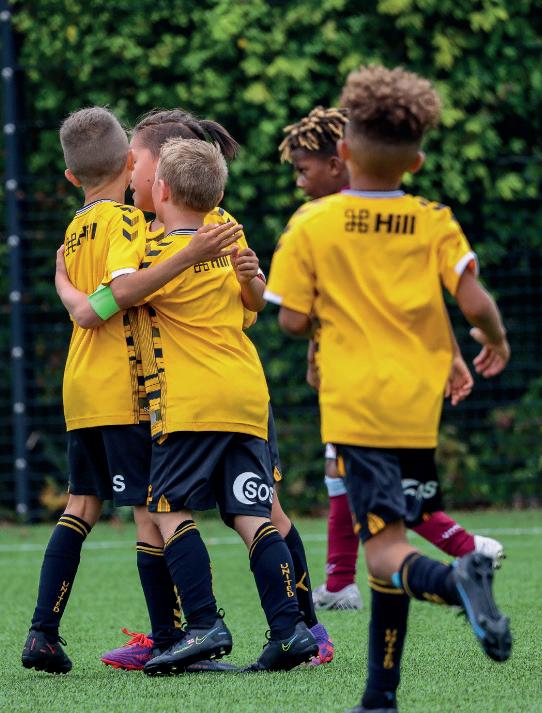
Our Games Program and Tour Program both play an integral role in ensuring we achieve our Academy Vision.
In order to create an environment where our players can achieve their highest level both in football and in life we want to be able to offer them a wide variety of experiences. One key method to achieve this is ensuring we create the most diverse games program possible for all of our players.
We have several mechanisms in place in order to plan for both what are our short and medium term goals as well as various ways to assess and continually review this regularly. This will enable us to adapt and not only meet the needs of the players but create experiences they would struggle to receive elsewhere and leaves a longing impression on the boys time spent in the Academy.

All registered Academy players participate in the games programme, set out in a regional format, provided by the Football League. All registered Academy players, when fit and available, will be included in the games programme.
The games programme organised by the football league may not provide 1 game/week throughout the course of the season. Therefore, in order to fulfil the 1 game/week target, we will try to arrange further friendly fixtures on free weekends where possible against other Academies across categories 1,2 and 3 as well as different Soccer Schools, Private Academies and County and representative teams.

The academies games programme is an important part of the players Individual Development Plans. The players are encouraged to work on their Learning Objectives as part of their plan within the games programme. The match day coaching staff should be aware of all the players IDP’s within their match day squad.
Each registered player has access to at least 1 game/week and plays at least 50% of the entire games programme over the course of the season.
All registered Academy players participate in the games programme, set out in a regional format, provided by the Football League. All registered Academy players, when fit and available, will be included in the games programme. The games programme organised by the football league may not provide 1 game/week throughout the course of the season. Therefore, in order to fulfil the 1 game/week target, we will try to arrange further friendly fixtures on free weekends where possible against other Academies across categories 1,2 and 3 and different Scholarship organisations. The academies games programme is an important part of the players Individual Development Plans. The players are encouraged to work on their Learning Objectives as part of their plan within the games programme. The Professional Development Phase Lead Coach will be aware of all the players IDP’s within their match day squad.

At the Professional Development Phase the games programme becomes competitive in structure, where only 5 substitutions can be made per match. Therefore, whilst the Professional Development Phase Lead Coach will try to adhere to the player participation targets set for the Professional Development Phase, team selection will be mainly based on:
1. Individual merit – previous performance in games and training
2. Team requirement/shape
3. Opposition
4. Long Term Development Pathway
5. Injuries
Each players playing time will be recorded on the PMA. It will be the responsibility of the Professional Development Phase Lead Coach to ensure that each registered player plays the targeted level of game time. If a registered player does not play the targeted level of game time over the course of a season, justification must be given by the Professional Development Phase Lead Coach to the Academy Management Team. All information will be reported to the Academy Management Team who have ultimately responsibility for the management of these Academy targets.
As part of our Academy Vision, creating the most diverse Games Program in Academy Football across all Category 2 & 3 Clubs is forever at the forefront of our mind and this includes the comprehensive Tours and Tournaments program that we co-ordinate.

Although previously we have produced an extensive Tour program for our players involving a wide variety of tours and tournament formats, we are looking to add to the Diversity to this part of our program in all aspects and there is some information from our Review at the end of the 2019/20 season that would suggest we are right to do this in order to achieve one of our Visionary Goals.
When planning our Tours, we always ensure that we take a holistic approach and look for all the possible benefits the players may experience such as eating out as friends, visiting stadiums, foreign schools, going swimming, playing different sports, sight-seeing as well as encouraging a wide variety of life skills development such as making their own bed, learning different languages, meeting new people, food shopping plus many more. These traits are so important for us encourage our young players to try if they are to achieve their maximum potential both on and off the pitch.
As part of your player review process you will receive an individual development plan which is specific to you and your needs.
As part of your player review process you will receive an individual development plan which is specific to you and your needs.
As part of your player review process you will receive an individual development plan which is specific to you and your needs.

Our Academy Management Team, along with members of the 1st Team staff Team have created what we look for in a Cambridge United FC Academy player’s DNA.
The identity of our DNA should be representative of both our registered Academy players as well as what we look for in ‘new signings’
Although every player may not have every part of our DNA, we will put structures in place to allow you to develop and succeed within our framework. Both coaches, practitioners and players should strive towards achieving this identity.
We would want to see individuals within our Foundation Phase to display an outstanding attribute or potential in at least two of our four GRIT pillars.
We would want to see individuals within our Youth & Professional Development Phases to display an outstanding attribute or potential in at least 3 of the four GRIT pillars
Game Intelligence Resilience
Astute players who demonstrate good decision makingability under pressure
Consistently give maximum effort and commitment and respond positively to adversity
Intensity
Ability to consistently perform to maximise physical outputs
Technical Ability
Consistently effective techniques relevant to specific positions
Ensuring we offer feedback to players is key in continuing to offer players the tools they need to recognise both what they are doing well as well as areas that we feel are needed in order to improve.
Players within our Professional Development Phase and Youth Development Phase receive these in written format through Individual Development Plan reviews every 6 weeks and players in our Foundation Phase receive this feedback every 12 weeks.
In addition to written feedback through IDP review, players and parents have an opportunity to sit down with staff and have a Parent/Player review meeting 2-3 times per season depending on the age of the player.
All Academy players will be giving access to an individual PMA account when you join the academy which gives you access to videos, reviews, training attendance and matchday feedback which is provided by the coaching staff.
https://pma.premierleague.com/Default.aspx
The club encourages all players to complete the PMA weekly self-reflection task after every match day. This encourages players to reflect on their weekly performance both in training and matches helping players self-reflect and build emotional self - awareness by taking the time to ask themselves important questions to gain a better understanding of emotions, strengths, weaknesses and driving factors.
The club have created a tutorial video which explains how you can do this, please scan the QR code on the right using your phones camera which will direct you to the clubs YouTube page where you can access this tutorial.

The comments will be monitored by Cambridge United Academy staff and where we feel necessary, we might reply to players comments and open dialogue to pose questions that are thought provoking to engage with the players.
In addition to this, you can also access video clips which provide opportunities for players to watch individual, unit and team clips to help consolidate and further support the players learning.

“To provide outstanding support and education to coaching staff and players to make players robust and relentless in all aspects of physical and mental conditioning, injury prevention and analysis”



1. Injury occurs in match/training
2. Inform coach/medical staff immediately– They will inform lead academy physio at end of session

3. Medical staff will assess pitch side – can you continue?
4. If yes, return to training – medical staff present will observe
5. If no, medical staff will provide management advice and advise to book into next clinic for full assessment.
6. Attend injury clinic on Tuesday or Thursday where you will be fully assessed and appropriate treatment advise will be given, and a plan for next steps will be put in place.
Injured player recieves assessment and treatment from Physio Staff
This is a flowchart of what you should do when you have had an injury that has kept you out of training or matches.
Player no longer clinically injured

Complete return to play fitness testing with relevent physio staff
Physio staff to handover information to lead Phase Coach
NO REACTION
Player phases back into training
Player injured and removed from training / fixture

Player completes return to training process
Reduce Pain and Inflammation
Improve flexibility, strength and stability
Player returns to noncontact training with reduced training time
Player returns to full contact training with reduced training time
This is a more detailed flowchart of the medical steps that will be taken should you suffer an injury and how you will have a phased return to training.
Straight Line Running (building up to full speed)
Straight Line Running (building up to full speed)
Change of Direction Running (building up to full speed)
Change of Direction Running (building up to full speed)
Football Specific Function Ball Work / Movements
Phased Return to Training
• These will be held on a Tuesday and Thursday evening.
• Tuesdays at Clare College with Alex Hunt, Thursdays at Newmarket with Sam Roblett.
• These are by appointment only which are available to book into on Kairos. Alternatively, you can book via emailing alexh@cambridgeunited.com
• If an injury occurs on a Sunday, medical staff at fixture will advise on whether you need to book into clinic for a full assessment.
• Players will no longer be able to turn up to be assessed at training, all assessments will be done via injury clinic.

1. Open Kairos on the app or on desktop
2. Click on the black plus sign in an orange circle, and select appointment
3. You should then be able to select the day, either Tuesday or Thursday, and see what time are available
4. Select a time that suits you best and book to confirm
5. All attendees will need to be accompanied by an adult
If you are struggling with booking an appointment through the app, you can email Alex at alexh@cambridgeunited.com and she can assist in getting you booked in.


Integrated within our syllabus the ‘PHYSICAL CORNER’ plays a huge in role across all ages as we look to nurture, enhance and maximise players physical capabilities across all of our age groups.
We try to ensure we maximise all disciplines within the ‘Coaching Syllabus’ so that we can ensure the players are not only excellent technically and tactically but also psychologically and physically.
The physical development or ‘Sports Science’ plays a major role within the Academy. From FUNDAMENTALS that you will see within our Foundation Phase all the way through to specific gym plans with our Professional Development Phase players.
You will see from the next slide that the main components of Physical Development integrated into the coaching program.
Trying to ensure that we make the physical development of players as age appropriate as possible for the players, you will see that throughout our program it is delivered in a way that we feel exceeds the resources that we have and impacts each and every player in a individual way for them and their needs.
The speed, strength and power from a physical development point of view needed in the game is more apparent than ever and we do our upmost to ensure our players embrace the physical development needed to make it to the professional game in a age appropriate way and in a way that is very much part of the whole program and not a stand alone process.

DESTROYER - Defending v a dribbler
Defensive footwork, blocking, interceptions, marking, body contacts, recovery runs.
CREATOR - Combination Play
Ball manipulation, scanning, receiving to get forward facing, protecting, staying on the ball, combining.
GOALSCORER - Finishing inside the box
Ball striking, shielding, receiving to finish, forward runs, one touch play, finding goalscoring positions.
Continue to develop the players tacticle understanding of the Cambridge United principles of play based around the team and individual needs.

Why is it important to be energised prior to training/matches, and how do we recover afterwards?
POSITION SPECIFIC
Can you perform specific physical characterisitics in order to technically and tactically compete in your position?
Can you efficiently move from one space to another rapidly, and with control? Do you display Agility, Balance & Co-ordination capabilities?
Fuel and Hydration
Why is it important to fuel ourselves correctly, and be hydrated prior to training/matches?
Kit and Equipment
Have we got everything we need to perform?
Ready to learn
Are we ready to learn?
All players within the Professional Development phase undergo a functional movement screen on at least one occasion during the season and are provided with individual prehabilitation programmes aimed at correcting any deficits / imbalances that are identified. Data from this movement screen is objective, in order to measure a player’s movement competency, and use numbers to track improvement. Programmes are performed in their own time and within designated group prehabilitation / activation sessions.
A functional movement screening session is performed twice per season for U9-16s. Movement and mobility programmes are filmed and uploaded to YouTube. Links to the videos can be accessed 24/7 by players and parents via Kairos communications app.

Before going out on the grass, Professional Development Phase players complete a series of exercises aimed at muscle activation and injury prevention. These exercises include strengthening techniques aimed at improving muscular function, stretching to improve flexibility and balance exercises to improve proprioception, and are also linked to the theme of the session (hamstring preparation when training in large spaces, and intensive preparation when training in small areas). These sessions are led by the Head of Academy Performance.
All Professional Development Phase players are provided with individual prehabilitation programmes aimed at correcting any deficits / imbalances that are identified within their functional movement screen. These are available to be completed in their own time and within designated group prehabilitation / activation sessions.
On the pitch all players complete a warm up consisting of a variety of dynamic exercises and movement patterns aimed at preparing players to begin training. In the Professional Development Phase this is a continuation of prehabilitation / activation working on certain aspects of muscular function specific to football. This is led by the Head of Academy Performance in the Professional Development Phase and by coaches under his guidance at the other age groups.

Players within the Professional Development Phase are monitored for heights and weights every 3-4 months to monitor growth and fluctuations in body weight. PDP players are required to complete skinfold body composition analysis 3-4 times per season, in order to understand if body weight added or lost is due to muscle or fat mass.
The height, weight and seated height of players within the Foundation Phase and the Youth Development Phase is taken 3-4 times a season to track player growth and give a prediction of maturation status. U13-U16 players have their Predicted Adult Height (PAH) reviewed at the same time as PHV testing. This information can also provide an indication of players who may be close to their growth spurt and who may, therefore, be at risk of “adolescent awkwardness” and/or increased risk of injury.
Information regarding maturation status is reported by the Lead Academy Sport Scientist to the Lead Coach of each phase and the Senior Physiotherapist by email and/or as part of the fitness testing reports. Particular reference is made to those players predicted to be within +/- 6 months of their PHV.



Players in the Professional Development Phase are required to complete a subjective wellbeing questionnaire on the PMA before arriving at the training ground each morning. This involves rating levels of energy, muscle soreness and sleep quality to give an indication of how they are coping with the training load and providing an early warning sign for potential overtraining or injury. Negative scores are reported to the Head of Academy Performance, Lead Academy Physiotherapist and coach. The player can then be assessed and if necessary, have their training programme altered.



All players within the Professional Development Phase follow a periodised week with Tuesday prioritised as a session with a physical conditioning focus. This session is designed in line with the guidelines provided by the Head of Academy Performance as part of a weekly planner.
The desired physical outcomes are incorporated within the football session with a focus on combining practises over short distances with more extensive games on larger sized pitches or practices done over longer distances with more intensive games on smaller sized pitches. Following the delivery of a CPD on incorporating the physical corner within sessions, coaches within the Foundation Phase and Youth Development Phase have also been encouraged to follow these principles of working in both smaller and larger spaces to develop a range of physical qualities guidelines in this regard are included within the coaching syllabus.

PDP and U16 players have individualised gym programmes to target areas of weakness noted in testing, develop super-strengths, improve athletic capabilities and improve robustness to aid long-term availability for training and fixtures. Gym programmes also target previous injury sites, with the aim of reducing the risk of re-injury. PDP players will be in the gym 2-3 times per week, depending on the playing schedule, whilst U16 players will be in the gym 1-2 times per week. Sessions are categorised into Uppers, Strength, and Power. Uppers sessions are performed 2 days after matchday to aid the recovery process. Strength sessions are performed 3 days after matchday to allow time for the lower limb to recover before being exposed to a tough stimulus. Players would have the day off after a Strength session, which allows better adaptations to take place, and for DOMS symptoms to reduce following a tough session. Power sessions are performed 2 days before matchday as they typically result in the least amount of soreness and fatigue.
Injured PDP players are provided with programmes to develop upper and lower body hypertrophy, strength, and aerobic conditioning to put them in the best position to return to play.
U16 players have more generic programmes to complete at the Training Ground on Tuesday evenings with Head of Academy Performance, with the aim being athletic development and muscle hypertrophy.
U9-U14s are given age-specific Physical Homework Programmes to complete around their training and match schedule. Programmes are provided as video footage, available 24/7 on the Kairos communications app. The programme aims to target stability and athletic movements to compliment their pitch-based Football and S&C sessions.

PDP and U16 testing sessions are aligned with the same battery of tests as the 1st Team, to better compare results between individuals and positions, with the aim of ‘bridging the gap’ between the Teams. PDP & U16 players perform gym-based 4 times and pitch based 2 times per season whilst U9-U15 perform pitch and gym-based testing 2 times per season. See below for tests:
• PDP & U16s- 1500m Aerobic Test, 10m & 30m Accel, 505 COD, CMJ, SL CMJ, Hop Test, IMTP, Isometric and Eccentric Hamstring Strength, 3RM Bench Press, Max Pull Ups and Max Press Ups.
• U9-U15s- 10m & 30m Accel, 505 COD, CMJ
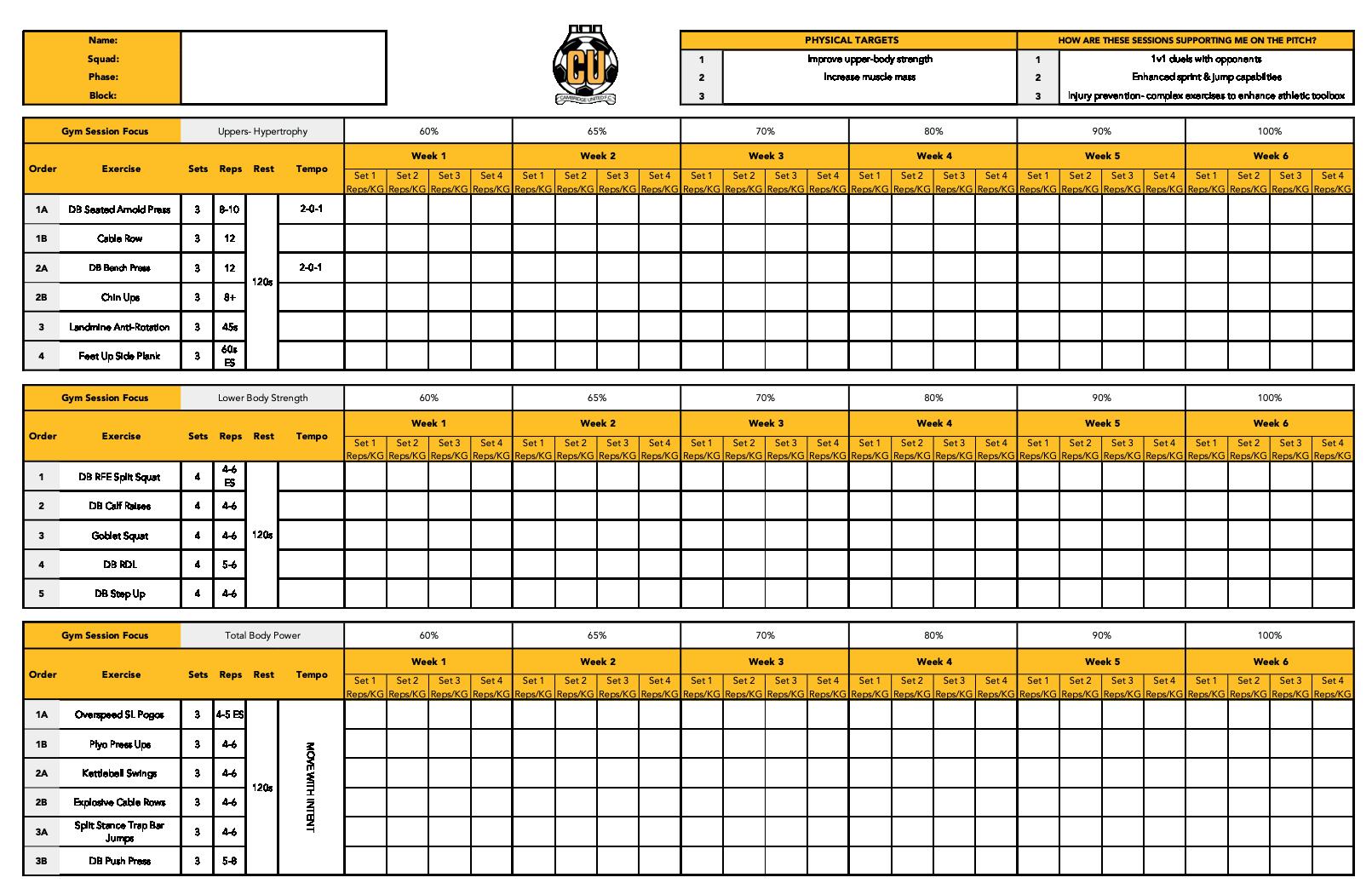



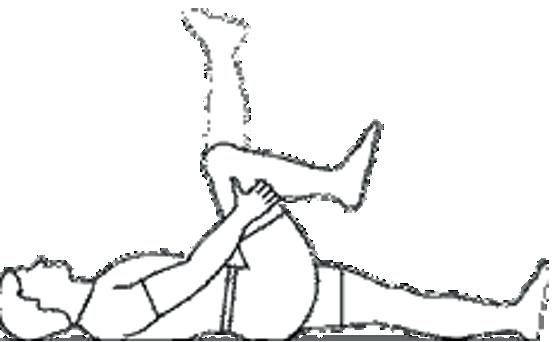

Flexibility is an important part of your development as a player because your muscles are responsible for any movement that you make. -

When your muscles are “tight” or “stiff" they cannot work as effectively and your movement is restricted. This will limit your ability to perform actions such as running, jumping and kicking correctly, which in turn will reduce your performance and increase the risk of injury.
Each exercise can be performed for at least 2x30 seconds on each side and repeated at least twice.




We have created a programme developed from the PDP down which has been integrated within the Coaching and Games Programme throughout the Academy.

This programme will be an integrated approach to developing psychological skills as opposed to a remedy method.
Currently, we hold player workshops throughout the season for different age groups covering a range of topics.
We place 6 key Psychological Skills at the head of this programme which are assessed throughout our programme.
The coaching staff discuss issues around the implementation of psychological skills within training sessions in line with the Psychology programme. Coaches are challenged to have psychological outcomes planed within their sessions if appropriate to an individual or unit.

The Youth Development Phase and Professional Development Phase players have workshops throughout the season to develop their psychological skills. These are in addition to trying to develop these skills within the coaching curriculum and on top of the already holistic development approach that operates throughout the Academy. Formal Psychological workshops will be delivered by Player Care Manager as part of the life-skills programme. The informal psychological work will happen through player discussions, performance reviews and messages that are communicated regularly on the training pitch.
The workshops in each phase will focus around The Resilience Corner of the four corner model, focusing on the topics:
• Resilience
• Focus
• Communication
• Confidence
• Mindset
• Emotional Control
Positive response to adversity
Key Competencies
Dealing with mistakes
Resilience
Maximum effort and commitment
• Self-regulation
• Mental Strength
• Coping Strategies
Awareness
Concentration
Key Competencies
• Decision making
Focus
Attentional narrowing
• Eliminate and ignore distraction
• Being present
Growth Mindset
Key Competencies
• Achievement Drive
Mindset
Dedication Hard Work
• Desire to improve and learn
• Self belief and confidence
Composure
Key Competencies
• Constant mental state regardless of condition
• Self-awareness and control
Emotional Control
Awareness of mental state
• Acceptance
Level head
Own ability to perform
Key Competencies
• Utilise past experience
• Robust mentality
Confidence
Sources of confidence
Team’s ability to win
• Utilise social support
Verbal/ non-verbal
Key Competencies
• Purpose and content
• Efficient communication
Active listening
Communication
Communication with different stakeholders
• Being a leader
Whilst looking to enhance and develop the psychological attributes in our players, there are many similar aspects when it comes to improving their social development and we try and focus on the following:
• Willingness to learn
• Can mix well with others
• Fair Play
• Teamwork
• Hardworking
• Honest
• Humble
We believe in holistically developing each individual on the programme. At Cambridge united we develop the person first and then the player.



• Try to include portions of Growth & Repair, Fuel and Protect foods throughout your plate.

• Remember to eat the rainbow with your Protect foods.
• Water is the best option for a drink to fuel and refuel.
INGREDIENTS:
½ tsp of vegetable oil

¼ chopped red pepper
¼ chopped yellow pepper
1 ½ chopped spring onions
2 eggs
4 tbsp of milk
1 pinch of black pepper
INSTRUCTIONS:
1. Heat 1tsp vegetable oil in a frying pan. Add peppers and spring onions. Stir-fry for 3-4 minutes until soft. Tip them out of the pan into a bowl.
2. Preheat the grill.
3. Beat the eggs and milk together. Heat a few drops of vegetable oil in the pan and pour one quarter of the egg mixture.
Prep Time = 10 mins
Cooking Time = 15 mins
4. Cook for 1-2 minutes to set the base. Sprinkle peppers and onion over then grill for a further 1-2 minutes.
5. Place the omelette onto a warm plate.







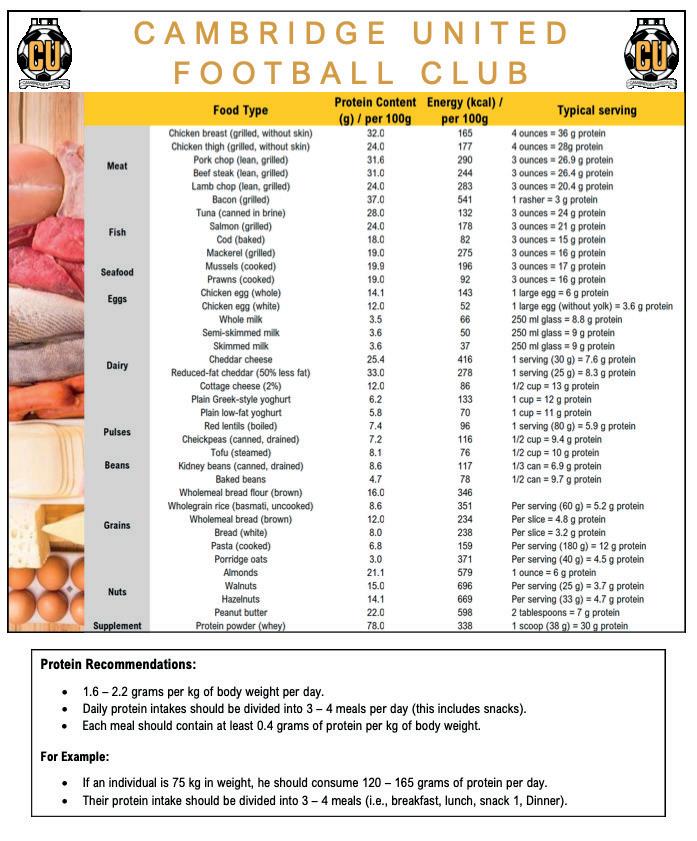
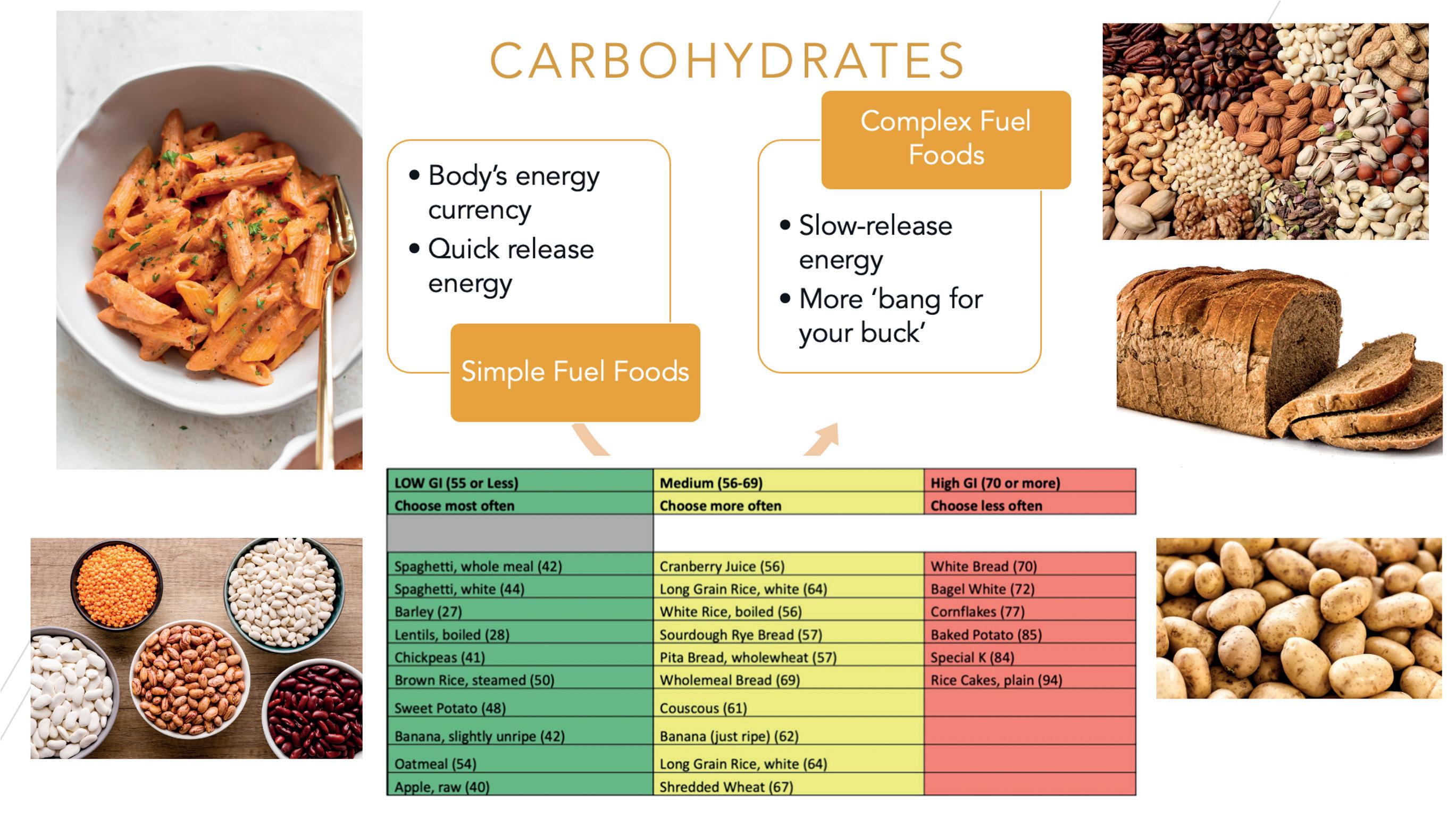
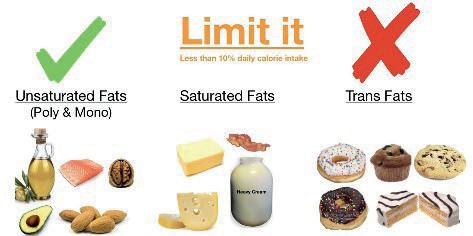
PROTECT- boost immunity and provide organ protection



Benefits of being hydrated…
Regulate body temperature Nutrient transport Waste product removal
Impact of dehydration…



Premature fatigue Impaired cardiovascular function
Replenish fluid lost through sweat
Impaired cognitive function Loss of electrolytes
• Bottle of water with you always.
• Lucozade- ½ bottle 10-15 minutes before games. Drink the remainder halfway through the game.


Nutrition is not a ‘one size fits all approach’….

Individualised thresholds are needed…
3,2,1 Rule…
Incredibly simple and easy to apply
E.g., 70kg Athlete would need:
210g of FUEL/Carbohydrate
140g of REPAIR/Protein
70g of Fats
4-6g/kg of FUEL/Carbohydrate DAY BEFORE a game
3
3g/kg of FUEL 2
2g/kg of REPAIR 1
1g/kg of Fats

The Analysis department has developed gradually over the last few years within the Academy and now plays a key role in across a number of departments.
The Lead Academy Analyst covers a wide range of aspects of the day to day Academy life and much like a lot of the Performance department, really maximises what we have within our limited resources.
A week in the life of the Lead Academy Analyst can include filming training and games, coding individual clips and producing match reports for YDP & PDP Games, helping film functional movement screens to aid the Sports Science and Medical staff with players rehab/prehab programmes, filming and clipping trialist footage to hand to the Head of Academy Recruitment as well as potentially filming meetings and Coach Competency Framework Sessions in order to help the Coaching staff analyse their performance both on and off the grass. Furthermore the analyst will assist in filming review meetings & additional workshops .
The pages below give an insight into their key weekly objectives and tasks as well as seeing what type of report they can produce for the PDP Coaching staff:

• Providing coaching staff across the phases analysis in regards to match performance, training sessions and opposition analysis (PDP only) as well as individual clips to assist in the development of Team performance players Individual Development Plan evidence


• Acting a resource to the PDP players whereby they can have an open conversation around what type of footage they may want to go through in order to keep reviewing and evaluated their own performances in both training and games. This can be used as a cross reference from player perception and stats and real time footage. This can again be used in Individual Development Review meetings from both staff and players.
• Constant communication with 1st team analyst to ensure similar processes are in place enabling players in transition to 1st team the ability to capture what is needed
• Using video footage to aid Academy Physiotherapist to investigate the origin injury to player in perhaps more detail
• Using video footage of players to allow the Performance Department to observe players movement skills to aid the planning of their individual physical programs
• Using footage to aid the decision making process around trialists to take place (mainly in the U15 – 18 ages)





As you can see from what you have just read, our PERFORMANCE DEPARTMENT ensure they collaborate both as a department but also with all other staff members including your coaches to ensure we are offering the most well-rounded support we can.
Our medical support, physical development programs, sports psychology and opportunities to review through video analysis are all in place to help you get the absolute maximum out of yourself and develop you as a well round athlete.
To which level this is achieved is down to you!
Are you willing to do extra?
“We aim to identify, recruit and support players with the potential to be first team professionals, capable of playing at the highest level”




Semi Pro / Education
U15 - U16 (1 Venue)
U13 - U14 (2 Venues)
U9 - U12 (4 Venues)
U6 – U8 (Pre-Academy)


U17 - U19 (CRC Scholarship)
U7 – U14 Regional Development Centres
Every single player will have a different start, middle and end point of their football career. It is important to understand that no journey will be the same.
You may have joined the Academy at a young age progressing through our Pre-Academy, or you may have joined our program later into the Youth Development Phase after excelling in grassroots football. However you got to this point, it is personal to you. This uniqueness will continue with you along your footballing pathway.

There may be times where you are asked to play in the age group above. There may be times where you are asked to play in the age group below. You may be invited on a tour to another country to play in a tournament and equally you might not be selected. There may even be times when the coaches give a decision against you in a training game on purpose just to see how you react.
We will always look to challenge and stretch our players in a number of ways both on and off the pitch as this is where ‘growth and development’ takes place.
So remember - attack every challenge, whether that be dealing with disappointment or dealing with success, do this with the same level of commitment and always remember to give it your all.
In wanting players to take responsibility for their own development, if there is ever anything you are unsure on or want to know the rationale behind a decision by a staff member… just ask!
Lewis Simper began his CUFC journey at one of our Regional Development Centre (RDC) at 6 years old, before eventually joining the Academy. After completing his two year scholarship, Lewis earned a 3 year professional contract. During that time Lewis has been sent out on loan to gain senior experience. He made his first team debut verses Morcambe on 9th April 2022.

We will always voice the importance of all players remaining focused on their own development journey as no two pathways are the same. There are many different highs and lows along the way; here are some examples of a few of our Academy graduates from recent years.
Harry Darling was signed with the Academy at U11. During a sustained period off the pitch through injury Harry decided to leave the Academy at U14 to regain match minutes playing locally for Newmarket Town FC. When Harry left school he then joined our Elite Scholarship program in conjunction with Cambridge Regional College. Not long after he was promoted into our full time Scholarship program and then eventually was offered a professional contract after impressive performances as Youth Team captain. Harry made his first team debut in league two verses Mansfield Town on 13th January 2018. Harry was sold to MK Dons in 2021 before following manager Russel Martin to Swansea City in 2022.
Liam Bennett, joined our Academy at the end of his U18 season from AFC Sudbury. Liam spent a season on loan at St Neots Town FC while training full time with Cambridge United first team. In Liam’s second season he had two loans, his first with Hemel Hemstead before being recalled due to a management change, he then joined Peterborough Sports before being recalled to the first team. Liam made his first team debut against Plymouth Argyle on 22nd February 2022. He started the 2022/23 season joining Walsall FC in League to on loan before returning the Cambridge and establishing himself in the team.


Cambridge United FC has a reputation of developing some of the best young talent in the South East of England. Therefore, from time to time, you or your parents may even get approached by certain individuals who are said to be representing a certain football club or intermediary company. If this happens to you, we ask that you inform a member of staff at the Club.

This will tend to happen (if at all) more regularly as you get older and we have experienced this with players previously through all different kinds of ways. This might be an individual at a game approaching you or your parent, this may happen in the car park, it may be that you receive a phone call and it may even be that someone contact you through Social Media.
As well as alarming poor practice from a Safeguarding point of view, this is not how professionals at good football clubs tend to conduct themselves.
They could be trying to do this for a whole range of reasons, so it is always best to ensure someone at the Football Club is aware of this approach and we can then act accordingly. We ask that you do this with the confidence that nothing will come back on you, other than praise for making the club aware of the situation.
You should also know that if there are any other Football Clubs further up the Football pyramid then ourselves that are interested in you, this will be dealt with by the two Clubs and you and your parents will be notified of such interest should it get to that stage. Only very recently you will be aware that a number of Academy players have left the Football Club to Clubs who have paid CUFC compensation for their registration and therefore, this also strengthens our stand point of ensuring we create an environment for our players to achieve their best. If we feel this is in your best interest should this arise, you and your parents will be the first to know.
U6 - U13
jakeh@cambridgeunited.com
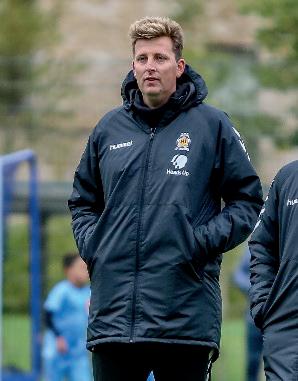

As brilliant young aspiring footballers, we all tend to know and play around with other really good young players.
It might be a friend from your school team, a younger brother or a cousin that has exceptional talent just like you.
If they would like to have the same opportunities as you and would like to attend a trial at CUFC then all you need to do is pass on the contact details of our Talent ID & Recruitment staff and they will get in touch with them.
Dan Laurent Head of Academy Recruitment U14– U20
danl@cambridgeunited.com
“We aim to have our players achieve the best academic progress out of any Football Academy in the UK”


Part Time Model – U9 - U15

Train 3 times a week with games program
Hybrid Model – U16

Train twice a week with Day Release and games programme
Full Time Model – U17- U18
Train full time whilst completing academic studies
In order for us to achieve our aim of having our Academy players achieve the best progress out of any Academy in the UK, we determine this by a formula of which we call:

VALUE ADDED is a fair measure of the progress that students have made. Rather than relying solely on exam results, it takes account of where each student started from (GCSE results prior to starting their Level 3 BTEC) and the progress they make (BTEC final grade)
Many of our players achieve above what their GCSE grades predict they should. This is sometimes in the course that they complete (Level 3 BTEC is equivalent to 1, 2 or 3 A Levels) or the grades they achieve – Pass, Merits or Distinctions
For example a player who had no GSCE’s Grades C (Level 4) or above. During his two year scholarship, he passed his English & Maths Level 2 Functional Skills exams and achieved MMM (triple Merit) Level 3 BTEC (equivalent to 3 A Levels) His predicted grade would have been to gain a Level 3 BTEC Pass (equivalent to 1 A Level)
Within the Foundation Phase no formal education programme is offered by the Academy. We adopt a part-time model in this phase. The coaching contact time is delivered after school throughout the week, at weekends, and during half term school holidays with regular weekend fixtures. The role of the Head of Education and Foundation Phase Coach in this phase is to create and maintain strong links with the schools at which the players attend and to help support the school, parents, and the player throughout the Foundation Phase. The Foundation Phase Lead Coach will be the first point of contact on a day to day basis.
A primary factor in the success of this is to have open and clear lines of communication in order to ensure that the player is managing the workloads and expectations from both School and the Academy. The Head of Education will be responsible for contacting each school throughout the academic year. Emails, letters, and formal reviews (PMA twice a season) will all be shared with our partner schools.
As an Academy we will communicate and highlight the rigours and potential pressures facing our young players that attend our Academy as we intend to generate a level of understanding and empathy towards those very rigours, pressures, and high levels of expectation expected of all young players at our Academy.

This will ultimately strengthen the support mechanisms and relationships between the schools, club, parents, and players. A visit to meet each Head-teacher or other senior staff at the schools associated with our young players will be offered to each school during the Academic year.
Currently our U9-U11 players receive a formal assessment twice a year. The formal assessment reports are also copied to the players’ school which again serves to strengthen the communication between all parties while providing the schools with informative feedback and a valuable insight into the progress that the player is making. Copies of school reports are also required by the Academy so the Head of Education and Foundation Phase Lead Coach can monitor each individual players’ progress and cross reference progress levels across both academic achievement and football development.
Within the YD phase the Academy runs a Part Time Training Model with a day release programme for selected under 15-16 players who have been offered a Scholarship (Hybrid model for a select group of players). In line with the vision of the EPPP, the Academy aims to create independent learners and effective decision makers and it is within this phase that we believe the education programme can make significant contributions to our player’s development.
The vast majority of our Academy players in the YDP will benefit from participation in the day release programme as they go through the ages, however, some will not be authorised to be absent from school and therefore will gain their training hours in the other three sessions during the week, with every effort being made to find additional hours such as in school holidays.
During the day release programme, the time allocation is shared between technical/tactical, strength and conditioning, study support, and rest/ recovery. Individual agreements have been reached with individual players and their respective schools and as a result of this the Academy will develop an individual-training-programme approach for each player participating in our day release programme.
In addition, our U12-U16 players receive a formal assessment twice per season alongside their 6 weekly PMA reviews. The formal assessment reports will also be copied to the players’ school around Dec-March and end of Season which again serves to strengthen the communication between all parties while providing the schools with informative feedback and a valuable insight into the progress that the player is making.


There are a number of ways in which we try and ensure we have the best intervention methods in place as possible to cater for the needs of each individual depending on their Academic capabilities and progress.
Should it be a individual who is not reaching their Academic potential or grade profile due to attitude, application or internal factors – this particular individual/s would be taken out of training/games programme if they were in the Full Time programme and measurements would be put in place for these students to replace ‘football sessions’ with education lessons.

In addition to this, should this be the case for any of our players in the Hybrid Day Release programme, they are immediately placed ‘on hold’ within that programme and are asked to attend school until the relevant improvements have been made which are agreeable between our Head of Education, School and Parent – our Youth Development Phase Lead Coach will also get involved in this process as it may mean training and fixture time is adjusted until improvements are made.
Although the above interventions are rare, our more common interventions are that helping our players with would be advice around compensatory education or accessing additional support for a full time player. For example, should we have any players within the Scholarship programme they may benefit from a teaching assistant this is put in place by our Head of Education and LFE Regional Officer, to help aid the players academic progress at a speed that is conducive to that particular individual.
The scholars work in a full time model and undertake their education in conjunction with the LFE. We are responsible for the delivery of the BTEC Level 3 and also the SEP Standard through both the LFE (League Football Education) and Cambridge Regional College. Functional Skills are also delivered by a tutor from LFE, for those who require it.

Within the Education programme the training model has four components:
• The BTEC Level 3 in Sporting Excellence and Performance Qualification
• Sporting Excellence Professional (SEP) Standard
• The UEFA C License
• Functional Skills (Level 2) In Math's and English
In addition to the above, should we have any Scholars who wish to complete A Levels and they fulfil the grade profile, along with LFE support our Head of Education provides one-to-one tuition for this players by arranging external tutors to deliver the subjects to the boys.
At our Academy, we believe that education and personal development are key components of a successful football career. The SEP Standard qualification, delivered by our Head of Education and a team of expert staff and guest speakers aims to give all scholars a holistic learning experience.
This course begins during the pre-season period and continues with weekly sessions on Monday mornings, covering a range of topics from performance reflection, goal setting to nutrition, antidoping, and communication skills.
Through the SEP Standard, our scholars develop their skills as independent learners and use reflective processes to improve their on-field performance.
In the first year, they cover a wide range of units and build a portfolio of evidence for all ten units, while in the second year, they go through End Point Assessment, which consists of;
• Knowledge Test
• Professional Interview
• Showcase Video Presentation
All three assessments are completed with an external independent assessor. Our Academy's programme is innovative and designed to be personalised, allowing each player to develop and succeed both on and off the pitch. This qualification assesses competency, knowledge, skills, and behaviour, going beyond the technical, tactical, physical, and psychological demands of the game.
To deliver a robust and efficient player care and safeguarding framework that protects children's welfare and wellbeing as well as promote holistic development of each individual.
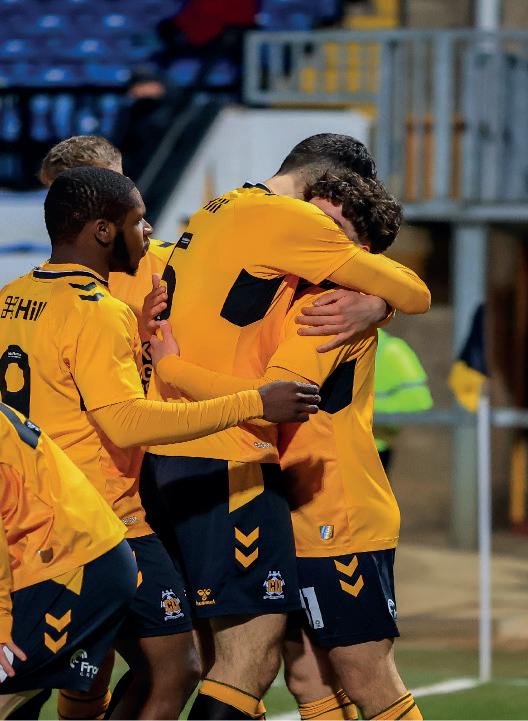
As a way of achieving our academy vision we want to continue to develop and implement a thorough life skills and personal development programme specific to all of our Academy players.

Our life skills and personal development programme in the Academy is age and phase specific with player workshops timetabled for the season. This programme is more comprehensive in the PDP and evidence of the outlined timetable is uploaded on the audit tool.
Life skills programmes will be phase specific and may include the following:
Nutrition
Sport Psychology programme
Finance skills
Sexual Health
Social Media/Sexting
Mental Health and Emotional Wellbeing
Life After Professional Sports (LAPS)
Work experience (alongside Cambridge United Foundation)

Player Appearances
Media Training
CV writing
Kick it Out
Schedules and planners are sent to parents in advance for any parent workshops that are timetabled throughout the season.
Alongside the Premier League, PFA and The FA, we are working to ensure that players are better educated, equipped and prepared for life both inside and outside of football. An increase in education provision empowers young players to make informed decisions about their futures and protect their well-being. As player's develop through the development phases of the academy system this will mean receiving education on the following topics:
- Mental & Emotional Well-being
- Dealing with the Media
- General Well-being (including Nutrition & Cardiac Health)
- Use of Social Media
- Working with the Community & Good Citizenship
- Financial Management
- Further Education & Careers Advice
For players within the Foundation and Youth Development Phases this will mean a focus on developing key aspects of being an effective team member and transferrable skills for life including:
Team Spirit Friendship Honesty
Understanding Emotions Resilience Respect
We value the person first and player second. Players may play a varying degree of minutes and be involved in different squads throughout the season - we will always endeavor to create a programme that is right for your son and his development.

Cambridge United Value the relationship between each young person we have in our academy system, the parents and The Football Club. We understand how much time, energy and commitment that each parent puts into their son’s development and how important it is that we holistically develop your son.
Cambridge United Value the relationship between each young person we have in our academy system, the parents and The Football Club. We understand how much time, energy and commitment that each parent puts into their son’s development and how important it is that we holistically develop your son.
We have developed a Parent Voice programme which will enable your voices and opinions to be heard throughout the season and we encourage you to participate and continue to give feedback through this programme as well as outside of this. We will follow up and take action on all matters brought to our attention.


We have developed a Parent Voice programme which will enable your voices and opinions to be heard throughout the season and we encourage you to participate and continue to give feedback through this programme as well as outside of this. We will follow up and take action on all matters brought to our attention.In terms of additional feedback the Player Care Manager will attend training reguarly and will be happy to speak to any parents/players whilst they are there. They will also have bookable appointment slots throughout the season in case paretn's wanted to have a more formal conversation.
In terms of additional feedback the Player Care Manager will attend training reguarly and will be happy to speak to any parents/players whilst they are there. They will also have bookable appointment slots throughout the season in case paretn's wanted to have a more formal conversation.
The Player Voice programme will continue allowing players to have a platform to be heard on a monthly basis. Again, this will be overseen by the player care manager however to aid development the onus is on our young individuals to bring topics to the table to discuss. The Player Care Manager will be responsible for actioning anything raised in these meetings.
The Player Voice programme will continue allowing players to have a platform to be heard on a monthly basis. Again, this will be overseen by the player care manager however to aid development the onus is on our young individuals to bring topics to the table to discuss. The Player Care Manager will be responsible for actioning anything raised in these meetings.
The tour programme we provide for players at Cambridge United FC is something we are incredibly proud of. The memories that are created during these moments and experiences are something the young players will never forget; from winning the tournament to scoring, or even missing the match-winning penalty - tours provide incredible opportunities to develop a team culture and individual traits like resilience and optimism, which are essential and transferrable to everyday life.

We use tours as a tool to develop players both on and off the pitch, and these experiences are certainly something to be celebrate and be viewed positively. However, whilst we recognise that the tour programme is a huge asset to each and every players development, not being selected can also have an impact on player well-being.
Parents of players not selected will be notified by Lead Phase Coach and given reasons why prior to Tour Squad List being released.
Tour Squad List sent via email to all selected players.
We will try to ensure that every player goes on at least 1 tour per season, however it is important to remember that non-selection for a tour isn't just based on picking the best team for that set of fixtures. We take every player's development into account and if there is a tour better suited for your son he will selected for the tour which will have the biggest benefits for him both technically and tactically on the pitch, but also socially and psychologically off the pitch.
Whilst wanting to create the best possible environment, and ensure all players are thriving within the academy, it is important to recognise and realise that there may come a time when your son is not retained in the academy system.
This can be a distressing experience for your son and the family unit as a whole, we aim to conduct this process in a sensitive manner in order to have as minimal an impact on other areas of your son's life as possible.
This transition will be led and managed by the Lead Phase Coaches in partnership with other appropriate members of staff. The following flow-charts will detail the steps that will be taken if your son is not retained within the academy.
Meeting with player & parent to discuss current performance level and IDP's. Player under review.
Player given opportunity to perform.
If, decision made to not retain player:
Meeting with player and parent to discuss reasons and options.
Players school contacted to inform them of decision.
Players immediate destination to be tracked by club
Help contact other clubs/Development Centres/ place within Elite Centre
Meeting with player & parent to disucss current performance level and IDP's. Player under review.
Player given opportunity to perform.
Player given opportunity to perform.
Meeting with player and parent to discuss reasons and options.
Players school contacted to inform them of decision.
Players immediate destination tracked by club
Help contact other clubs/Development Centres/ place within Elite Centre and/or register for EFL Exit Trials (U16/18)
We value your son's time spent within our Academy, and although a decision may have been made for him not to continue at Cambridge United, this hopefully isn't the end of his footballing endeavours. We aim to provide a high level of support after his release by providing:

- Potential extended training opportunities
- Signposting and support to other interests
- 1, 3 & 6 month 'keep in touch' calls
- Offered a place within elite centres/elite scholarship (to monitor progress)
- Contact other Category 3 Academy's/EJA teams (at your discretion)
- Opportunity to discuss options with Academy Sport Psychologist
The welfare of young players at the Academy is of paramount importance to the Club and our commitment to this is outlined in the Academy Safeguarding Children Policy.
The key principles to our strategy are as follows:
Ensure safe recruitment is in place so that the right people are working with our young players who are appropriately qualified and experienced.
Ensure staff and volunteers know and understand their roles and responsibilities and have clear policy guidance – thus creating a framework within which they can work effectively.
Ensure every person involved within the Academy receives information and has ongoing training appropriate to their role which helps them understand the action they must take if they have a concern about the welfare of a young player or receive a disclosure regarding the abuse of a child.
Training and understanding should involve the Academy’s young players, parents/carers, coaches, managers, Academy staff, host families and any other staff or volunteers who interact with our Academy players. All coaching staff, and any other relevant personnel, will have a valid FA Safeguarding Children accreditation and will receive ongoing CPD & guidance on Safeguarding during their employment.

glennq@cambridgeunited.com


07889 563341
Should you have a concern regarding the welfare or safeguarding of anyone please contact the Head of Academy Operations and Safeguarding: Glenn Quirke
The PFA Safety Net - https://thepfa-safetynet.com/
The PFA has created this platform to support players and parents both during and after their time within academy football. Players can register for free and have access to a number of different resources; including videos that cover topics such as: being released, and dealing with performance anxiety.

EFL Self-Help Guides - http://www.selfhelpguides.ntw.nhs.uk/efl/
The English Football League (EFL) have created self-help guides with support from the NHS. These guides cover a variety of areas including depression, stress and sleeping problems. Mind - https://www.mind.org.uk/
Mind have a collection of resources and support online to help support you both in football but also wider life.
Over the last few years, a number of things have been put in place to aid in the running of Cambridge United Academy and make things easier for us as staff and you as parents and players.

Weekly fixture and training information will be communicated via Kairos, minibus available for away fixtures with our designated Academy Driver.
If you would like information on the upcoming fixtures, you can access this via the Kairos App available at the following link: Kairos Sports (kairostech.app)
Should you have any questions or support please contact glennq@cambridgeunited.com we will always do our utmost to help!




Abbey Stadium, Newmarket Rd, Cambridge, CB5 8LN
Clare College Sports Ground, Bentley Rd, Cambridge, CB2 8AW
Newmarket Town Grounds, Cricket Field Rd, Newmarket, CB8 8BT
St Neots Town Football Club, 5 Kester Way, Saint Neots, PE19 6SL
St Ives Town Football Club, Westwood Road, St Ives, Pe27 6DT
Bottisham Village College, Lode Road, Bottisham, CB25 9DL
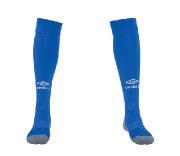




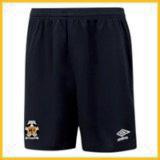

All players will be provided with a match kit. In order to purchase your training kit please contact Glenn Quirke who will send you a link.



How do I order kit?
There is a kit booking link for Kit Locker you can check the relevant sizing; you order your Kit Pack which is delivered directly to your door. There is also an accessories tab where you can buy additional items such as Winter Coat, Snood, and hats.
How do I get tickets to a first team game?
As part of the Academy, you as a player get a free ticket as long as you are accompanied by a paying adult for a CUFC Home League Fixture. There are certain fixtures where we may be able to offer parents free tickets also. You must request tickets at least 3 days in advance by contacting the ticket office.
How do I book a physio appointment?
You must inform your lead phase coach you are requesting a physio appointment. In order to book your appointment email alexh@cambridgeunited.com

How do I book a place on the minibus for Academy Away matches?
When you receive your weekly match information it will also contain information on whether there is a minibus. Should you want to be in on the minibus simply request this by email to glennq@cambridgeunited.com.
How do I report any safeguarding concerns?
In order to report a safeguarding concern, you can contact any member of staff with which you feel comfortable informing. They will then take the necessary steps with the Head of Academy Operations and Safeguarding to ensure your concern is handled appropriately.
Can I play for my school?
We encourage our players to play in all types of games and are more than happy for players to represent their school. However, if this is on the same day as a CUFC training session then we would actively encourage our players to have a discussion with their lead phase coach around what is most beneficial for the player.

How do I access my PMA account?
Please see the PMA page earlier in the handbook. Should you have a problems with your PMA then contact your Lead Phase Coach.
How do I access the online calendar?
When you sign with the club you will be sent a link and instruction email showing you how to use Kairos on your laptop or phone. Should you need this link again you can request it from your Lead Phase Coach.
What
Please contact your lead phase coach however if you cannot make a fixture on short notice then please ensure you call the relevant coach to inform them











To create an aspirational and nurturing academy that offers a lifelong, memorable journey
